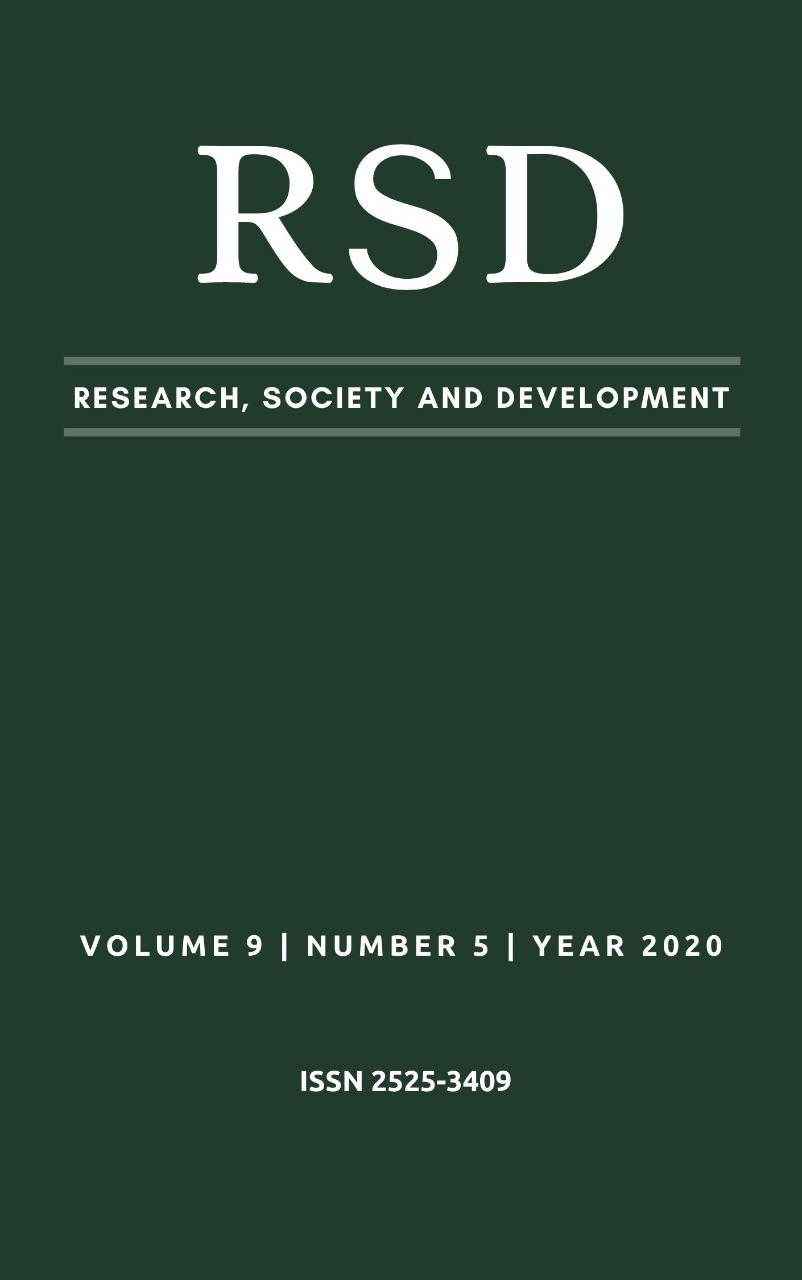Geleia de crista de galo com pectina de maracujá
DOI:
https://doi.org/10.33448/rsd-v9i5.3261Palavras-chave:
Celosia cristata L., PANCS, Sensorial.Resumo
O baixo incentivo aos estudos e divulgação de resultados relacionados ao uso das PANCS – Plantas Alimentícias Não Convencionais no Brasil, faz com que esta população descarte alimentos de alto poder nutritivo e fácil acesso substituindo-os por alimentos ultra processados, restritos e repetidos em nutrientes. O presente trabalho visou demonstrar a utilização da PANC Celosia cristata L. na elaboração de geleia, e mensurar sua aceitabilidade com os alunos pós-graduandos em alimentos pelo IFTM do município de Uberlândia – MG. Foram analisados os dados obtidos pela entrevista através da aplicação de questionário e execução de teste de aceitabilidade com escala hedônica estruturada mista de cinco pontos. Os resultados obtidos na pesquisa podem ser considerados relevantes por permitirem uma visão da aceitabilidade do produto, elaborado com a PANC. Mesmo sendo um produto desconhecido pelo público, a avaliação sensorial e perspectiva de compra foram positivas. Os comentários adicionais foram relatados por alguns alunos, que complementaram a pontuação obtida no teste. O presente trabalho vem de encontro a divulgação de novas propostas de uso das PANCS no cotidiano alimentar dos brasileiros, auxiliando na manutenção da saúde, além de, serem opção de baixo custo.
Referências
Abreu, N. C. O; Diniz, J. C. (2017). As vantagens da Introdução das Plantas Alimentícias Não Convencionais na Alimentação dos Beneficiários do Bolsa Família da Estratégia Saúde da Família Bernardo Valadares, em Sete Lagoas-MG. Revista Brasileira de Ciências da Vida. 5 (4): 16-19.
Bispo, E.S., Santana, L.R.R., Carvalho, R.D.S., Leite, C.C & amp; LIMA, M.A.C. (2004). Processamento, estabilidade e aceitabilidade de marinado de vongole. Ciência e Tecnologia de Alimentos. 24(3): 353-356.
Costa, S. de S., Faria, A. B. de, Leão, P. V. T., Oliveira, L. A. de, Silva, J. A. G., Medeiros, J. S. (2020). Levantamento de atributos sensoriais de brigadeiros gourmet de leite desnatado e integral por homens e mulheres. Research, Society and Development. 9 (4), e160943037. ISSN 2525-3409. DOI: http://dx.doi.org/10.33448/rsd-v9i4.3037.
Krolow, A. C. R. (2013). Preparo artesanal de geleias e geleiadas. Pelotas: Embrapa Clima Temperado, Documento 138, 40 p. ISSN 1516-8840. Available from < https://www.infoteca.cnptia.embrapa.br/infoteca/bitstream/doc/1018391/1/Documento138.pdf > Access on: 20 Mar. 2020.
Ferreira, G. V. J., Tavares, P. E. R., Silva, M. G., Tavares, M. P., Cipolli, K. M. V. A. B. (2016) Desenvolvimento de geleia de café, visando a elaboração de produtos destinados a mercado "Gourmet". In.: 10º Congresso Interinstitucional de Iniciação Científica – CIIC, agosto, Campinas, São Paulo, 1-12 p. ISBN 978-85-7029-135-6.
Hoger Filho, G. (2003). Aspectos fitopatológicos do cultivo da celósia em Curitiba, PR. Universidade Federal do Paraná, Setor de Ciências Agrárias Departamento de Fitotecnia e Fitossanitarismo, Pós-Graduação Em Agronomia Produção Vegetal (dissertação). 86 p. Available from < https://acervodigital.ufpr.br/handle/1884/26553> Access on: 27 Feb. 2020.
Fonseca, C., Lovatto, P., Schiedeck, G., Hellwig, L., Guedes, A. F. (2018) A importância das Plantas Alimentícias Não Convencionais (PANCS) para a sustentabilidade dos sistemas de produção de base ecológica. Associação Brasileira de Agroecologia. 13 (1). Anais do VI Congresso Latino-americano de Agroecologia do Distrito Federal e Entorno; 12 a 15 de setembro de 2017, Brasília/DF. 1-7 p. Available from < http://cadernos.aba-agroecologia.org.br/index.php/cadernos/issue/view/1 > Access on 27 Feb. 2020.
Liberalesso, A. M. (2019). O futuro da alimentação está nas plantas alimentícias não convencionais (PANC)? Universidade Federal do Rio Grande do Sul. Centro de Estudos e Pesquisas em Agronegócio. Programa de Pós-Graduação em Agronegócio (Dissertação). 77 p. Available from < https://lume.ufrgs.br/handle/10183/197796> Access on 27 Feb. 2020. http://hdl.handle.net/10183/197796http://hdl.handle.net/10183/197796
Paeadela Filho, O. Soave, J., Ribeiro, I. J. A., Mendes, H. C. (1971) Ocorrência de Meloidogyne javanica (Treub 1885) Chitwood 1949, em Gelosia argentea L. Bragantina: Campinas, 30 (2), 49-53 p. Available from <http://www.scielo.br/scielo.php?script=sci_arttext&pid=S0006-87051971000200018&lng=en&nrm=iso>. Access on 27 Feb. 2020. https://doi.org/10.1590/S0006-87051971000200018.
Paiva, W. O. de. (1978) Amarantáceas: Nova opção de espinafres tropicais para a Amazônia. Acta Amazonica, Manaus, 8 (3), 357-363 p. Available from <http://www.scielo.br/scielo.php?script=sci_arttext&pid=S0044-59671978000300357&lng=en&nrm=iso>. Access on 27 Feb. 2020. https://doi.org/10.1590/1809-43921978083357.
Peixoto, L. S., Dourado, S. H. A., Costa, R. V., Reis, J. A., Tavares, L. F., Nascimento, M. A. N. (2019). Oficinas sobre Plantas Alimentícias Não convencionais em um Centro de Referência de Assistência Social. Expressa Extensão. 24 (2). 27-38 p. ISSN 2358-8195. Available from <https://periodicos.ufpel.edu.br/ojs2/index.php/expressaextensao/article/view/14892> Access on 27 Feb. 2020. HTTP://DX.DOI.ORG/10.15210/EE.V24I2.14892.
Pereira, A.S. et al. (2018). Metodologia da pesquisa científica. [e-book]. Santa Maria. Ed. UAB/NTE/UFSM. Disponível em: https://repositorio.ufsm.br/bitstream/handle/1/15824/Lic_Computacao_Metodologia- Pesquisa-Cientifica.pdf?sequence=1 . Acesso em: 28 março 2020.
Downloads
Publicado
Edição
Seção
Licença
Autores que publicam nesta revista concordam com os seguintes termos:
1) Autores mantém os direitos autorais e concedem à revista o direito de primeira publicação, com o trabalho simultaneamente licenciado sob a Licença Creative Commons Attribution que permite o compartilhamento do trabalho com reconhecimento da autoria e publicação inicial nesta revista.
2) Autores têm autorização para assumir contratos adicionais separadamente, para distribuição não-exclusiva da versão do trabalho publicada nesta revista (ex.: publicar em repositório institucional ou como capítulo de livro), com reconhecimento de autoria e publicação inicial nesta revista.
3) Autores têm permissão e são estimulados a publicar e distribuir seu trabalho online (ex.: em repositórios institucionais ou na sua página pessoal) a qualquer ponto antes ou durante o processo editorial, já que isso pode gerar alterações produtivas, bem como aumentar o impacto e a citação do trabalho publicado.


